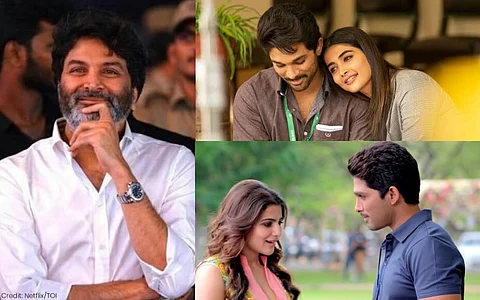The Trivikram Srinivas Universe: Dowry As A Vital Part Of A Wedding
"Amma, Avakai, Anjali… yeppudu bore kottaru." That line from Nuvve Nuvve (2002), Trivikram Srinivas' first film as director, is perfectly splendid. Its simplicity lies in its alliteration and the insertion of avakai (mango pickle that Telugus swear by) between Amma (mother) and Anjali (the film's lead, portrayed by Shriya Saran).
Rishi (Tarun), in that particular scene, pulls Anjali close and tells her that those things will never bore him. It's a snuggly, romantic gesture that elevates the otherwise mundane picturisation. You can count many such one-liners from films that Trivikram has made, or written dialogues for. Almost every line in Nuvvu Naaku Nachav (2001) and Manmadhudu (2002) hinges on hilarity. It's all fun and sunshine-y until you hear his thoughts.

Trivikram has always made his characters bat for dowry. When Anjali's father argues in the climactic portion that he has everything under control, from the wedding hall to the bridegroom that he has handpicked, Rishi enlightens the middle-aged man. The young lover says, "Whenever wedding invitations are distributed, people usually enquire about the muhurtham than the dowry they are giving, or the money they are spending on the event."
Rishi's point is simple — in the time the father has taken to indulge in mud-slinging, Anjali has lost the opportunity to get married as they have moved past the auspicious time. But why would Rishi feel the need to stress on dowry while talking about muhurtham and its importance? Well, in isolation, it sounds like a throwaway line. It needn't exactly mean the filmmaker is an active participant of the dowry club. But over the years, his attitude towards that has remained the same. And once you look at his nearly-two-decade career, it becomes clear he hasn't grown much as a writer.
His 2015 movie S/O Satyamurthy has a sub-plot involving the theft of money kept aside for dowry — around Rs one crore. The miscreants aren't really outsiders; they belong to the bride's family. But what's baffling is that nobody condemns the act of giving dowry. The bride's father blames the criminals alone and does not comment on the groom's demand.

Viraj Anand (Allu Arjun), who's afraid the wedding might get cancelled in the absence of the dowry money, single-handedly takes on the goons and retrieves it. He's a wedding planner and knows he won't get paid if the wedding doesn't take place. He goes on to call the groom a great guy later in spite of the drama he just witnessed.
Unlike what happens in Nuvve Nuvve, the little story in S/O Satyamurthy isn't boxed in a conversation. It's an essential part of the film.
And in this year's Butta Bomma sensation Ala Vaikunthapurramuloo, Bantu (Allu Arjun, again) tells a few local thugs he can save almost a lakh rupees on dowry since they think his sister is beautiful. That kind of thinking, he continues, stems from his middle-class mentality. If you lay it down and examine the theory properly, Trivikram — through Bantu — says that pretty women needn't pay too much dowry.
In the 18 years since he stepped into the industry as a filmmaker, Trivikram has held on to the pillar of dowry. No one ridicules the patriarchal system in his films; you can't find a single voice of reason anywhere.
Furthermore, he thinks getting married and having children is the best option for women if they're not good at any of the following — music, dance, studying, and working. That dialogue-heavy scene is from A Aa (2016) where a mother berates her daughter for not seizing the opportunity. The father, who's also present during the altercation, is the one that slips in this remarkable piece of advice, "If you get her married to a guy, she will become a good wife, and a good mother."

Trivikram doesn't hesitate to show sons taking over their fathers' business empires — Agnyaathavaasi (2018) and Ala Vaikunthapurramuloo more or less deal with that subject. But he avoids passing on that responsibility to women. Children do not have to be burdened with their parents' dreams all the time; they can rebel and find their own roads to travel on. The problem, however, is with how differently the director treats male and female characters.
Why can't there be a person who talks ill about dowry and states it for what it is? And, why shouldn't female protagonists run successful businesses? Intentionally, or unintentionally, writers — and other artists — reveal their innermost beliefs through their works. They may add several filters to their ideas and unleash them through the mouths of their characters. But, if something seeps through those filters for nearly two decades without any change, it's called a pattern and not a coincidence.

